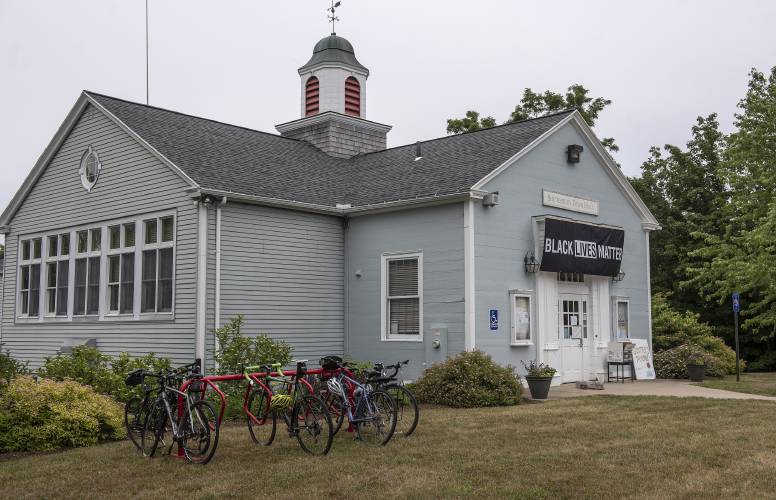
Shutesbury Town Hall is located at 1 Cooleyville Road.
Gazette file photo
After municipal broadband rollout over the past decade or so, all Leverett and Shutesbury residents have access to high-speed internet connections, but a small number of households still choose not to become subscribers.
In Westhampton, the 2022 Master Plan Survey shows more than nine in 10 residents recognize broadband infrastructure is critical to serving the town and sustaining the local economy. However, some residents, especially those in remote areas and so-called “last mile” communities, still do not have internet connectivity.
Understanding the challenges that remain in getting broadband access to all homes, three communities in Franklin and Hampshire counties joined 75 other towns and cities this week in participating in the Massachusetts Municipal Digital Equity Planning Initiative, an initiative of the Massachusetts Broadband Institute ’s initiative to help communities with resources bridge the digital divide and expand internet access.
Shutesbury and Leverett will work with consultants from the Franklin Regional Council of Governments, with a primary focus on identifying barriers to internet access, finding solutions to bridge existing digital divides, and addressing issues around affordability, digital literacy training, device access and any other obstacle.
Gayle Huntress, manager of Shutesbury Municipal Light Plant and chair of the Broadband Committee, said the plan is in its early stages and aims to improve residents’ digital assets.
“Our municipal broadband network covers the entire town, which means we’ve solved the infrastructure problem,” Huntress said. “The focus now is on improving access to technology and education.
In 2015, Shutesbury voters approved a $1.69 million Proposition 2.5 Debt Exclusion to fund the project and achieve the goal of providing active gigabit service to 90% of homes for just $ $60. Now, the town is committed to connecting the last 10 percent of residents by addressing affordability issues, helping seniors acquire digital skills (particularly cybersecurity), connecting to resources such as the federal Affordable Connectivity Program, and creating, disseminating, and analyzing Survey to reveal equity gaps.
Leverett is the first of 45 rural communities in western and central Massachusetts to complete a last-mile network project launched in 2012 after Proposition 2.5 covered debt forgiveness to pay for 39 miles of aerial network , with MBI providing $666,000 to supplement the $3.6 million project.
LeverettNet is the municipal broadband network available to every resident, with 95% of households subscribed. But the town will work with its consultants to survey the other 5 percent of unsubscribed households to determine their barriers to connectivity, which could include cost, training and equipment. MBI’s support will lead to a complete report, which is important because the town does not have the resources to conduct a comprehensive digital equity needs assessment.
For Westhampton, residents understand the importance of reliable broadband, such as during emergency response. Officials are prioritizing reliable high-speed internet access by working with service providers and MBI to learn more about existing network availability and reliability. for more information. The town will also work to distribute devices, expand literacy and create financial resources to help those without internet access.
“Massachusetts continues to lead the nation in addressing the digital divide and providing town resources to increase accessibility and education,” Massachusetts Economic Development Secretary Yvonne Howe said in a statement.
“This program will enable more cities to empower their residents by providing not only internet access, but also the necessary training, equipment and expertise to compete in the digital economy,” Hao said. “With business, job opportunities and With vital resources moving online, ensuring strong connections are vital to residents’ excellence now and into the future.”
Scott Merzbach can be reached at smerzbach@gazettenet.com.